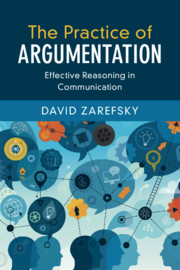Book contents
- The Practice of Argumentation
- The Practice of Argumentation
- Copyright page
- Dedication
- Contents
- Preface
- Chapter 1 The Argumentative Perspective
- Chapter 2 What Arguments Look Like
- Chapter 3 The Emergence of Controversy
- Chapter 4 Evidence in Argumentation
- Chapter 5 Argument Schemes
- Chapter 6 Fallacies
- Chapter 7 Case Construction
- Chapter 8 Attack and Defense
- Chapter 9 Language, Style, and Presentation
- Chapter 10 Where and Why We Argue
- Appendix Learning Argumentation through Debate
- Bibliography
- Index
Chapter 4 - Evidence in Argumentation
Published online by Cambridge University Press: 06 September 2019
- The Practice of Argumentation
- The Practice of Argumentation
- Copyright page
- Dedication
- Contents
- Preface
- Chapter 1 The Argumentative Perspective
- Chapter 2 What Arguments Look Like
- Chapter 3 The Emergence of Controversy
- Chapter 4 Evidence in Argumentation
- Chapter 5 Argument Schemes
- Chapter 6 Fallacies
- Chapter 7 Case Construction
- Chapter 8 Attack and Defense
- Chapter 9 Language, Style, and Presentation
- Chapter 10 Where and Why We Argue
- Appendix Learning Argumentation through Debate
- Bibliography
- Index
Summary
When you advance an assertion in conversation with another person, that person might accept it immediately. Or the person might reject it out of hand, refusing even to listen to any more about it. Most reactions, however, fall somewhere between these two extremes. The other person is not yet satisfied that you are correct in what you assert but is willing to give the matter some more thought. Such a person might respond by asking, “What do you have to go on?” or “What makes you say so?” Questions of this sort are requests for evidence that will back up the assertion you have advanced. This chapter is concerned with evidence and its role in argumentation.
Information
- Type
- Chapter
- Information
- The Practice of ArgumentationEffective Reasoning in Communication, pp. 84 - 103Publisher: Cambridge University PressPrint publication year: 2019
